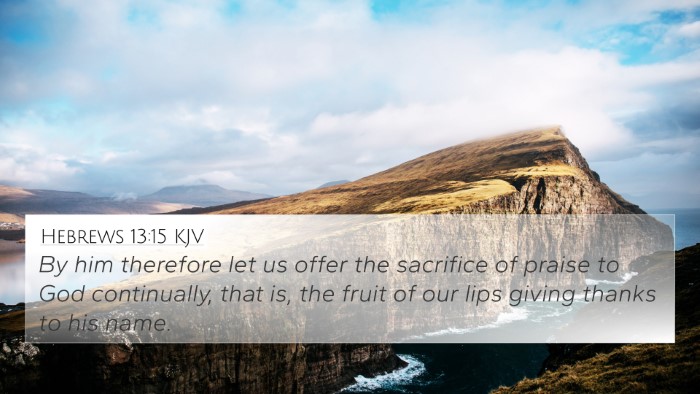Understanding 1 Thessalonians 5:18
Bible Verse: “In every thing give thanks: for this is the will of God in Christ Jesus concerning you.”
This verse from 1 Thessalonians encapsulates a profound and pivotal teaching found throughout Scripture, emphasizing the importance of gratitude in the life of a believer. The call to give thanks in every circumstance reflects not only an attitude of gratefulness but also an acknowledgment of God's sovereignty and goodness. Below, we delve into the meanings derived from several public domain commentaries to gain a richer understanding of this passage.
Meaning and Interpretation
- Matthew Henry's Commentary: Henry emphasizes that giving thanks is a duty that believers owe to God. He notes that this directive is comprehensive; it instructs us to offer thanks in every situation, acknowledging that each circumstance can lead to spiritual growth. Henry places significance on the phrase “the will of God,” suggesting that gratitude is not merely a suggestion but a divine command that aligns with God’s purpose for believers.
- Albert Barnes' Notes: Barnes interprets this verse as a testament to the nature of a Christian's duty. He points out that gratitude should be a consistent attitude regardless of life's ups and downs. Furthermore, he discusses how thanksgiving is inherently linked to our relationship with Christ, suggesting that recognizing His presence in our lives prompts us to express appreciation continually.
- Adam Clarke's Commentary: Clarke provides a practical perspective, stating that gratitude can transform our perspective on challenges. He emphasizes that thanks should be given not for the trials themselves but in the midst of them, pointing to a deeper faith that trusts God's purposes. Clarke also links this verse to the broader theme of Christian resilience, which trusts in God's plan.
Key Cross-References
1 Thessalonians 5:18 connects to numerous other scriptures that enrich its meaning. Here are 10 parallel verses that highlight the theme of gratitude in Scripture:
- Colossians 3:17: “And whatsoever ye do in word or deed, do all in the name of the Lord Jesus, giving thanks to God and the Father by him.”
- Psalms 107:1: “O give thanks unto the Lord; for he is good: for his mercy endureth forever.”
- Philippians 4:6: “Be careful for nothing; but in every thing by prayer and supplication with thanksgiving let your requests be made known unto God.”
- 1 Chronicles 16:34: “O give thanks unto the Lord; for he is good; for his mercy endureth forever.”
- Romans 8:28: “And we know that all things work together for good to them that love God, to them who are the called according to his purpose.”
- Ephesians 5:20: “Giving thanks always for all things unto God and the Father in the name of our Lord Jesus Christ.”
- James 1:17: “Every good gift and every perfect gift is from above, and cometh down from the Father of lights.”
- Hebrews 13:15: “By him therefore let us offer the sacrifice of praise to God continually, that is, the fruit of our lips giving thanks to his name.”
- Revelation 11:17: “Saying, We give thee thanks, O Lord God Almighty, which art, and wast, and art to come; because thou hast taken to thee thy great power, and hast reigned.”
- 2 Corinthians 9:15: “Thanks be unto God for his unspeakable gift.”
Thematic Connections
The theme of thanksgiving is intricately woven throughout both the Old and New Testaments, establishing a profound connection between various passages. The consistent exhortation to give thanks reflects a thematic connection that spans different contexts and eras.
1 Thessalonians 5:18 is not merely situated in isolation but resonates with the broader narrative of Scripture, showcasing the enduring value of gratitude among believers. This verse's placement within Paul's epistle to the Thessalonians emphasizes how integral thanksgiving is to Christian living, reinforcing the principle that gratitude is both an act of worship and a pathway to spiritual fullness.
Practical Application and Reflection
Believers are encouraged to reflect on their lives in light of this scripture. The directive to give thanks “in everything” challenges us to cultivate a habit of gratitude, regardless of circumstance. Such practice not only aligns with God's will but also promotes emotional and spiritual well-being.
In studying 1 Thessalonians 5:18, one might ask: “How can I incorporate gratitude into my daily life?” By creating a list of things to be thankful for, engaging in prayer that includes thanks, and reflecting on God's past faithfulness, brothers and sisters in Christ can deepen their appreciation for God’s constant presence and provision.
Conclusion
In conclusion, 1 Thessalonians 5:18 serves as a critical reminder of the power of thankfulness in a believer's life. By exploring this verse through various commentaries and cross-references, we see that cultivating an attitude of gratitude is not just beneficial but essential. As we move forward, let us strive to embody this principle, allowing our hearts to overflow with thanks in every situation, genuinely embodying the will of God for our lives.












